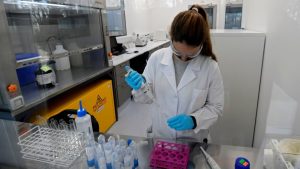
WHO says world should not live ‘in hope’ of achieving herd immunity without vaccine.
The World Health Organization says the planet is nowhere near the amount of coronavirus immunity needed to induce herd immunity, where enough of the population would have antibodies to stop the spread of the virus.
Herd immunity is typically achieved with vaccination, and most scientists estimate at least 70 per cent of the population must have antibodies to prevent an outbreak. But some experts have suggested that even if half the population had immunity, there might be a protective effect.
WHO’s emergencies chief Dr. Michael Ryan largely dismissed that theory at a media briefing on Tuesday, saying we should not live “in hope” of achieving herd immunity.
“As a global population, we are nowhere close to the levels of immunity required to stop this disease transmitting,” he said. “This is not a solution and not a solution we should be looking to”. Most studies conducted to date have suggested only about 10 to 20 per cent of people have antibodies.
Dr. Bruce Aylward, a senior adviser to WHO’s director general, said that any mass immunization campaign with a COVID-19 vaccine would aim to cover far more than 50 per cent of the world’s population.
“We don’t want to be wrong,” he said. “You want to plan to get high coverage and not get lulled into a dangerously seductive suggestion that [the herd immunity threshold] could be low.” National supply deals in the event of the development of a successful vaccine against the coronavirus should fit a global approach, Aylward said.
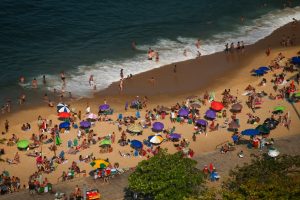
World leaders pledged in late April to accelerate work on tests, drugs and vaccines against COVID-19 and to share them around the globe under a WHO-led initiative known as the ACT (Access to COVID-19 Tools) Accelerator.
Aylward urged that the world must administer widespread anti-flu vaccinations this year to help to ward off the risk of complicating coronavirus infections.
The health body also said Tuesday it was concerned that coronavirus spread was being driven by people in their 20s, 30s and 40s, many of whom were unaware they were infected, posing a danger to vulnerable groups.
WHO officials said this month the proportion of younger people among those infected had risen globally, putting at risk vulnerable sectors of the population worldwide, including the elderly and sick people in densely populated areas with weak health services.
“The epidemic is changing,” WHO Western Pacific regional director Takeshi Kasai told a virtual briefing. “This increases the risk of spillovers to the more vulnerable.”
What’s happening with coronavirus in Canada
As of 11 a.m. ET on Tuesday, Canada had 123,046 confirmed and presumptive coronavirus cases. Provinces and territories listed 109,155 of those as recovered or resolved. A CBC News tally of deaths based on provincial reports, regional health information and CBC’s reporting stood at 9,076.
British Columbia’s surge in new COVID-19 cases is showing no sign of slowing, with another 236 cases confirmed since Friday afternoon.
There are now 743 active cases of the illness in the province, which is the highest total to date, and the addition of 100 new cases on Saturday marked the highest one-day tally so far.
Monday’s briefing was led by Deputy Provincial Health Officer Dr. Réka Gustafson, who said another two people have died from the novel coronavirus in B.C., bringing the province’s total to 198.
She said the majority of new cases continue to involve young people, who often have mild versions of the COVID-19 illness caused by the virus.
“This actually makes things quite challenging. That’s because some people might not realize they have COVID-19, and they can inadvertently spread it,” Gustafson said.
A total of 4,594 people in B.C. have had confirmed infections of the virus since the start of the pandemic. Of those, four are in hospital, including three in intensive care, marking the lowest hospitalization count since a provincial state of emergency was declared.
Here’s what’s happening around the world
According to Johns Hopkins University, the global total of confirmed coronavirus cases is now more than 21.9 million. More than 774,300 people have died, while 13.9 million have recovered.
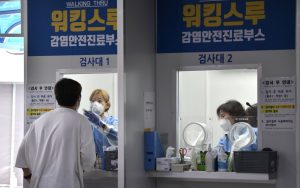
- South Korean health officials said Tuesday that they have found 457 coronavirus cases linked to a huge Seoul church led by a bitter critic of the country’s president, driving an alarming surge of infections in the greater capital area.
Kwon Jun-wook, director of South Korea’s National Health Institute, said outbreaks at the Sarang Jeil Church and elsewhere have pushed the country into the biggest crisis yet since the emergence of COVID-19.
He said a failure to slow transmissions in the densely populated Seoul metropolitan area, home to nearly 26 million people, could create a situation comparable to the “miserable scenes of the United States or European countries.” South Korea reported 246 new cases of the coronavirus on Tuesday, raising its total for the last five days to 959.
- Australia on Tuesday recorded its lowest one-day rise in new COVID-19 infections in a month, raising hopes that a stringent lockdown in the country’s second-most populous state has prevented a fresh wave of cases nationally.
Led by cases in Victoria state — the epicentre of Australia’s latest COVID-19 outbreak — Australia said it has detected 226 new infections in the past 24 hours, the lowest since July 18 when 212 cases were recorded.
Victoria said it detected 222 cases in the past 24 hours, while the country’s most-populous state, New South Wales, reported three new infections.
- New Zealand on Tuesday ruled out the possibility that a coronavirus outbreak in its biggest city of Auckland came from frozen food items or freight, as it reported 13 new cases.Investigations suggested the virus had not come through chilled services or material arriving from overseas at an Americold cold-storage facility in Auckland where one of the recently infected individuals worked, health officials said.
“Seems clear now that the possibility is being ruled out from that investigation,” Director General of Health Ashley Bloomfield told reporters.
- Venezuela’s rate of infection of COVID-19 is set to overwhelm its testing capacity, likely leading to an artificial flattening of the contagion curve, a lawmaker and medical adviser to Venezuelan opposition leader Juan Guaido said on Monday.
The government of President Nicolas Maduro maintains Venezuela performs the highest number of COVID-19 tests in the region per million inhabitants.
The country has registered 33,755 infections and 281 deaths, and infections have exceeded more than 1,000 a day.
The French government plans to make wearing a mask compulsory in the vast majority of workplaces from Sept. 1 to try to stop a resurgence of the COVID-19 pandemic. The Labour Ministry said on Tuesday the new arrangement would apply to all shared spaces in offices and factories, but would not extend to individual offices where only one employee is present.
It also said that working from home would remain its recommended option for employees. A government official said masks at work would become mandatory from Sept. 1. The origin of the latest outbreak is still unknown, and transmission through the environment in the cold storage was one theory being considered.
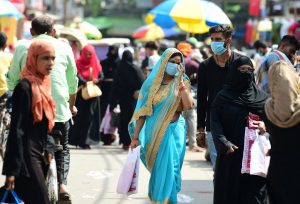
- India reported more than 55,000 new cases on Tuesday, putting its total virus caseload past 2.7 million.
India has the third-most cases, behind the U.S. and Brazil. It also has the fourth-most deaths from the coronavirus, with 51,797.
But India’s deaths per million people stands at 34 — far lower than what has been reported in some North American and European countries.
- South Africa, which had one of the world’s strictest anti-coronavirus lockdowns for five months, relaxed its restrictions Tuesday, permitting sales of alcohol and cigarettes in response to decreasing new cases and hospitalizations for COVID-19.
In a festive mood, people lined up at shops across the country wearing face masks and keeping a safe distance to purchase the previously banned liquor and cigarettes.
“We have passed the first peak and we are comfortable in easing restrictions now … but we must keep up our vigilance,” said Prof. Salim Abdool Karim, chairman of the government’s COVID-19 advisory committee.
CBC/MS


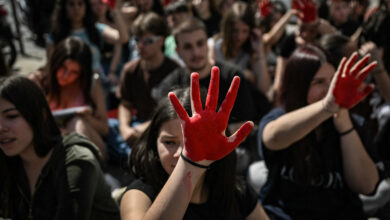
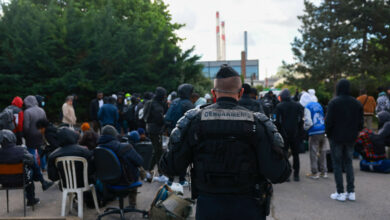
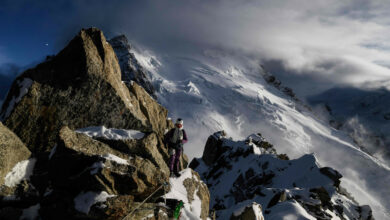


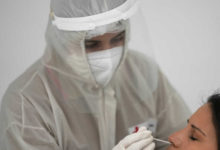
Redes Sociais - Comentários